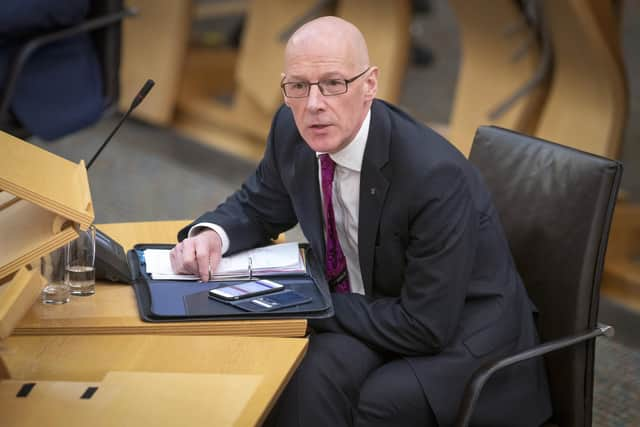Scots back tax cuts for poorest but against top rate abolition, poll shows
This article contains affiliate links. We may earn a small commission on items purchased through this article, but that does not affect our editorial judgement.
However, calls from the Scottish Conservatives for interim finance secretary John Swinney to follow Kwasi Kwarteng’s abolition of the top rate of tax would have been given short shrift by the electorate, with the move opposed by half of Scots.
Nicola Sturgeon repeatedly said she would refuse to bow to opposition pressure to follow the Chancellor in cutting taxes for the richest, a debate that became moot after the UK Government’s screeching U-turn on the policy during the Conservative party conference.
Advertisement
Hide AdAdvertisement
Hide AdThe poll, undertaken by Savanta ComRes for The Scotsman, interviewed 1,029 Scottish adults aged 16 and over between September 30 and October 4.
The survey showed just 26 per cent of Scots backed the abolition of the top rate of tax, with 49 per cent opposing such a move and 25 per cent either saying they neither supported nor opposed or didn’t know.
The picture for lower earners, however, is markedly different, with Scots wanting the Scottish Government to follow the tax cuts for the lowest earners.
In total, more than two-thirds of Scots back a penny cut to the basic, starter and intermediate rate of tax, currently sitting at 19, 20, and 21 per cent respectively.


Such a move would cost the Scottish exchequer around £400 million in foregone revenues at a time of significant budgetary pressure.
Deputy First Ministe rJohn Swinney will announce the Scottish Government’s draft plans for the tax rates and thresholds on December 15 when he publishes the Scottish Budget.
While rejecting outright abolishing the top rate of tax, ministers have been coy around cuts to lower bands, refusing to rule out such a move.


The pressure on the Scottish Budget is likely to be further pressured by increased pay demands from the public sector, with deals for council and railway workers already above pre-planned rises.
Advertisement
Hide AdAdvertisement
Hide AdTeachers are set to vote in a ballot on strike action from next week, with pay deals also yet to be agreed with some NHS staff.
Polling shows Scots are supportive of striking workers, with 66 per cent backing them. However, support is dependent on the type of public sector work.
Scots are most likely to support nurses and council workers striking, followed by teachers, railway workers and doctors.
The Scottish Government also appears to avoid being blamed for industrial action in Scotland, despite pay deals often being dependent on Scottish Government Budget decisions.
Polling figures show a third of Scots (36 per cent) blame the UK Government for strike action, with fewer than one in five (18 per cent) blaming the Scottish Government.
Trade unions are blamed by 14 per cent of Scots, with employers being blamed by just over one in ten (11 per cent), and councils blamed by 7 per cent.
Just 4 per cent blame workers themselves, with 9 per cent stating they did not know who was to blame.
All episodes of the brand new limited series podcast, How to be an independent country: Scotland’s Choices, are out now.
It is available wherever you get your podcasts, including Apple Podcasts and Spotify.
Comments
Want to join the conversation? Please or to comment on this article.

